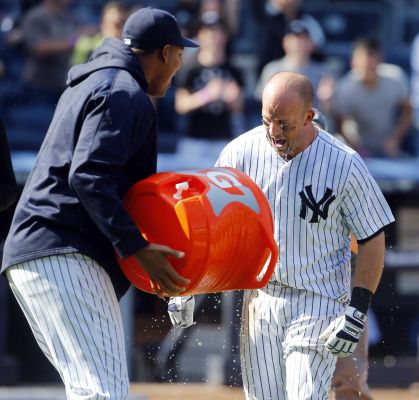
Stealing a win
The Yankees woke up from their nightmare and temporarily broke out of their massive slump on Friday night, beating the Rays 6-3 in the series opener. Yes, six runs is considered an offensive explosion these days.
Jacoby Ellsbury may not have started the game, but he still delivered the most electrifying moment of the season so far, swiping home in the bottom of the fifth inning to even the score at 3-3. It was the first straight steal of home by a Yankee at Yankee Stadium since Gerald Williams on May 29, 1993 vs. the White Sox.
Ellsbury also sparked the offense with two hits and two RBI in three at-bats after taking over for the injured Aaron Hicks. He is the first Yankee in more than four decades — since Jerry Kenney in 1969 — to come off the bench and produce at least two hits, two RBI, a stolen base and a run scored in a game.
Let’s go streaking
Break out the champagne, folks … the Yankees finally put together a win streak with a dramatic walk-off victory on Saturday against Tampa Bay.
Brett Gardner was the hero, tying the game in the seventh inning with an RBI infield single and then earning himself a Gatorade shower with a two-out towering blast into the right field seats in the bottom of the ninth inning. It was his sixth career walk-off hit, the most by any Yankee since his debut in 2008.
Gardner also became just the third Yankee left-fielder in the last 85 seasons to hit a two-out, walk-off homer, joining Gary Thomasson (1978) and Charlie Keller (1941).
The Rays called up their top pitching prospect, Blake Snell, to start the game and the 23-year-old lefty put on quite a show in the Bronx. He worked five innings, allowing one run on two hits with six strikeouts and a walk. Mixing his mid-90s fastball with a knee-buckling curve plus a handful of changeups and sliders, Snell had a truly impressive and historic performance.
He is the only pitcher in the last 100 years to make his major-league debut against the Yankees and pitch at least five innings, allow no more than two hits while striking out at least six batters. The last guy to make his major-league debut against the Yankees at Yankee Stadium and give up one run or fewer with six-or-more strikeouts was Luis Tiant in 1964.
No sweep for you
All good things must come to an end. The Yankees dropped the series finale on Sunday, failed to complete the three-game sweep and fell back into last place in the AL East.
Their offensive struggles continued with just one run scored on six hits, the eighth time in 17 games this season they’ve been held to two runs or fewer. That’s tied for the most such games in the American League this season.
As much as you can blame the cold bats for the loss, the Yankees were never in this game thanks to a horrible outing by Michael Pineda. The Rays pummeled him in the first inning, belting out six consecutive two-out hits — two of which left the ballpark — to take a 5-0 lead.
Pineda gutted out another four frames and finished with one of the most bizarre pitching lines you’ll ever see: five innings, 10 hits, seven runs, nine strikeouts, four home runs, one walk. Yes, there’s some dominance in there (nine strikeouts), but also a bunch of poorly located fastballs/meatballs (four homers).
With that Hekyll-and-Jyde performance, Pineda became the first Yankee pitcher in the last 100 seasons to allow four-or-more home runs and strike out at least nine batters in a game. In the past 20 years, the only other Yankees to give up 10-plus hits and have nine-plus Ks in an outing of fewer than six innings pitched were Roger Clemens (2003) and David Cone (1998).
Overall, the Rays got 12 hits and struck out 16 times. Never before in franchise history had Yankees pitchers given up that many hits and recorded that many strikeouts in a nine-inning game.
Rays outfielder Steven Souza Jr. etched his name in the Yankee record books with a rare and nearly unprecedented display of power on his 27th birthday. He is just third player ever with a multi-homer game at Yankee Stadium (old or new) on his birthday, along with Justin Morneau (2009) and Bernie Williams (2003).
Leave a Reply
You must be logged in to post a comment.